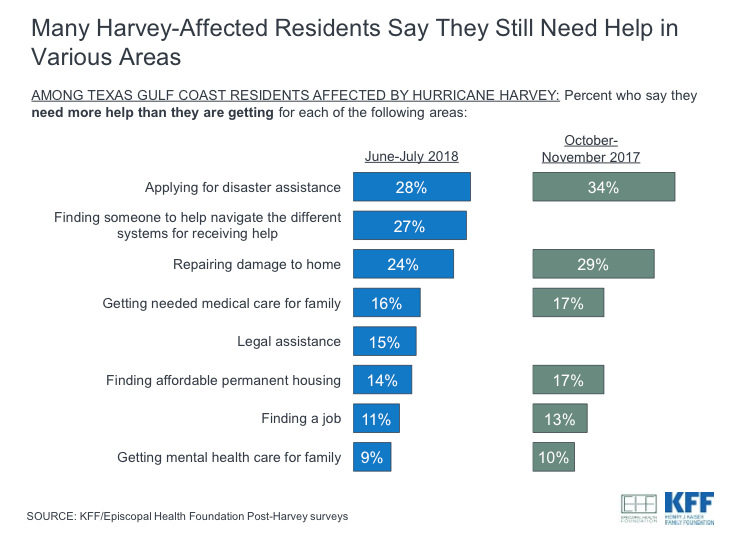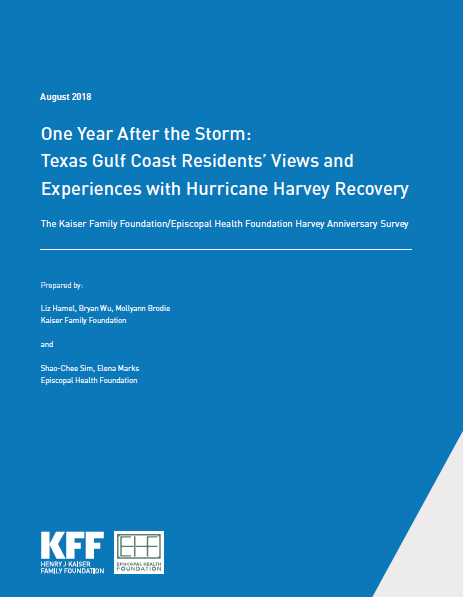
Nearly a year after Hurricane Harvey hit Texas, 30% of residents affected by the storm say their lives remain disrupted. That’s according to an Episcopal Health Foundation/Kaiser Family Foundation survey of residents in the 24 hardest-hit Texas counties.
The Harvey anniversary survey is a key part of EHF’s ongoing effort to change the conversation to ensure that those most in need receive the help they need the most after Harvey.
“One year later, many of those with the fewest resources are still struggling to bounce back from Harvey’s punch,” said Elena Marks, EHF’s president and CEO. “This kind of information is crucial to letting government and other recovery organizations know what Texans still need for a long-term comeback.”
Shao-Chee Sim, EHF’s VP for applied research, and his team presented the survey findings to nationwide philanthropy groups, local governments, Harvey town hall meetings, post-Harvey conferences, and the Governor’s Harvey Recovery Workgroup. Many long-term recovery groups working across Texas primarily used information from the survey to invest funds and resources in areas in most need highlighted by the survey results.
Local, statewide and national news coverage featured stories on the many different struggles identified in the survey, including articles in the Houston Chronicle, The New York Times, The Wall Street Journal, Washington Post, Texas Tribune, Associated Press, and many more.
WATCH: Elena Marks’ appearance on KPRC-TV Houston NewsmakersOverall, the new survey found 70 percent of affected residents say their lives are largely or almost back to normal, up from 56 percent three months after the storm. The survey found 8 percent of all residents remain displaced from their pre-Harvey homes. This includes 20 percent of Golden Triangle area (Beaumont/Orange/Port Arthur) residents.
One worrisome sign: 42% of affected residents say they are not getting the help they need to recover, essentially unchanged from our first survey three months after the storm. Affected residents most likely to say they aren’t getting the help they need include Black residents (60%), those living in the Golden Triangle (50%), or those who have self-reported incomes below $50,000 for a family of four (50%).

The biggest areas of need are applying for financial assistance (28% of affected residents say they need more help), navigating the different systems for receiving aid (27%) and repairing home damage (24%).
Affected residents also say they need more help finding affordable housing (14%), finding a job (11%), and getting health care (16%) and mental health care (9%). These shares are little changed since three months after the first survey, suggesting that help has been slow to come to those most in need.
 See complete survey report
See complete survey report
Three in 10 impacted Texans say Harvey affected their mental health, but few say they’re getting help
About three in ten (31%) affected residents report some storm-related negative effects on their mental health, including having a harder time controlling temper (19%), feeling their mental health has gotten worse (18%), taking a new prescription for a mental health issue (10%), or increasing their alcohol use because of Harvey (6%). These shares are similar to those reported three months after Harvey, suggesting there has either not been much improvement or there has been further decline since then.
Despite the relative prevalence of these issues, few (8%) affected residents say that they or someone in their household has received mental health services since the storm. A similarly small share (11%) say there was a time since the hurricane when they thought they or a family member might need mental health services but did not receive them. These shares are somewhat higher among those who say their lives are still disrupted from the storm.
Health effects from the storm persist
Overall, 16% of affected residents say they or someone in their household has a health condition that is new or has gotten worse since Harvey. That’s similar to the share reporting health problems three months after the storm, suggesting that many health effects from the storm continue to linger. The most commonly reported new or worsening health conditions include respiratory problems such as asthma, coughing or other breathing problems (32% of those reporting a health condition), and high blood pressure (10%).
WATCH: A summary of the survey findings on KPRC-TV’s Houston Life